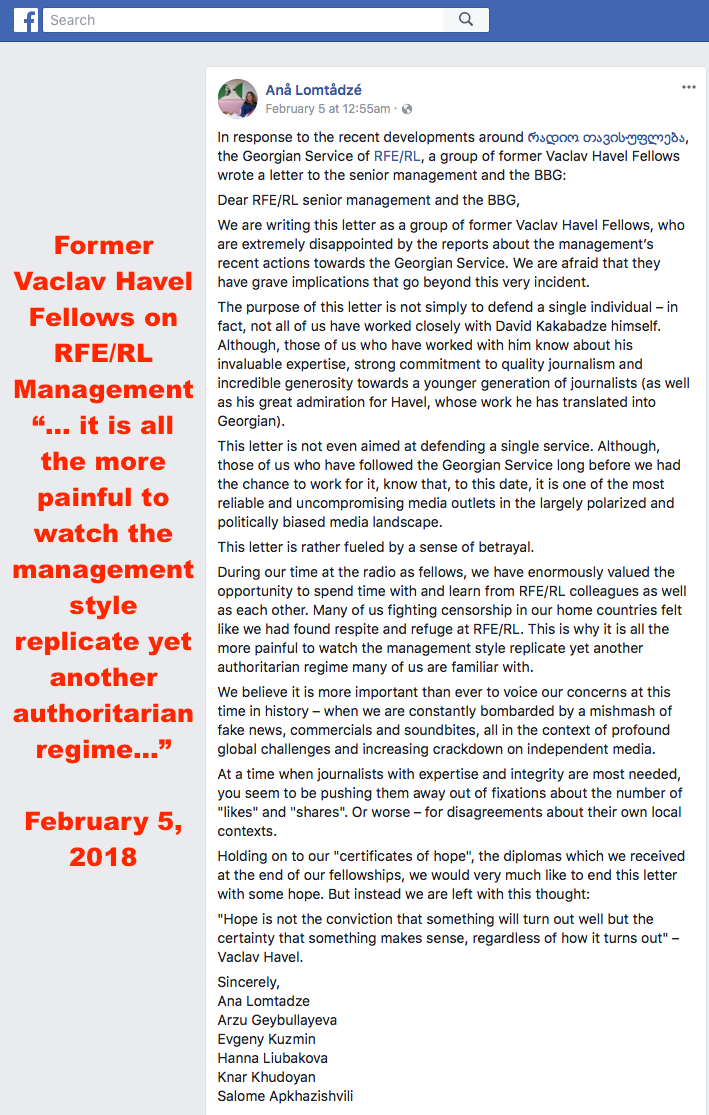BBG Watch Commentary
Asem Tokayeva, another woman journalist who had worked for U.S. taxpayer-funded Radio Free Europe / Radio Liberty (RFE/RL), has made public her blistering criticism of the media outlet’s senior management led by President Thomas Kent and his deputy Nenad Pejic. They report to the Broadcasting Board of Governors (BBG) U.S. federal agency currently led by Obama-era appointee BBG CEO John F. Lansing.
Forced out of RFE/RL as part of management-initiated reorganization of the Kazakh Service, Tokayeva wrote in a Facebook post, “It is necessary to change all top management; only then the creative environment will revive at the RFE/RL.” She charged that when ordinary journalists seek help from RFE/RL President Thomas Kent, “as he would be a final instance, he does not respond to their letters” and allows the bureaucracy “to crack down on dissidents.”
A former RFE/RL woman journalist who now has a successful career elsewhere wrote: “Everyone who leaves RFE/RL has the same observations. And people who leave RFE/RL are often principled journalists who quit or are pushed out. I was one of them. It’s also an extraordinarily sexist organization.”
Another woman journalist, a producer of award-winning documentaries, wrote:
“Omg!!! She left?!! She is v good journalist! What’s going on?
This must be stopped”
With her public criticism of RFE/RL’s leadership, Tokayeva follows in the footsteps of other award-winning women journalists, Khadija Ismayilova, Shahida Tulaganova and Dr. Marina Vashakmadze, who recently had quit the organization in protest against the senior management’s treatment of journalists. Several young journalists who had worked at RFE/RL as part of their prestigious Vaclav Havel fellowships, have also published blistering criticism of RFE/RL’s top leadership.
Those showing the greatest courage in publicly expressing their frustration with RFE/RL’s management and actually quitting their relatively well-paid jobs with the media organization have been mostly women. More and more of RFE/RL’s women journalists have been rising up in protest against the management, which they perceive as both seriously disengaged from employees and “authoritarian” at the same time. The accuse RFE/RL senior management of deepening stagnation and making creative work by talented staff extremely difficult.
Two women who had quit the organization told BBG Watch that according to their observations, RFE/RL President Thomas Kent usually stayed in his office, while day-to-day operations were being left largely in the hands of RFE/RL Vice President and longtime manager Nenad Pejic.
Khadija Ismayilova, a former political prisoner in Azerbaijan, an investigative reporter and winner of many international journalistic awards who recently quit RFE/RL, wrote in a public Facebook post that senior executives in charge of the organization suffer from “a crisis of career stagnation“ and don’t know how to communicate with journalists.
“People do not leave good organizations,” Ismayilova wrote in another public Facebook post. “I resigned from this organization because they didn’t hesitate to fire the best journalists,” she added.

Co-producer of award-winning HBO documentary on Syria and former anchor of RFE/RL-VOA Russian-language TV program “Current Time,” Shahida Tulaganova, who also quit RFE/RL, wrote in her January 25, 2018 Facebook post, RFE/RL management “kills journalism, incentive and values we do this job for.”
“Time to shake up this organization,” Shahida Tulaganova shared her views on Facebook about RFE/RL’s senior management.
Khadija Ismayilova, the recipient of the 2017 Magnitsky Award, the 2016 UNESCO/Guillermo Cano World Press Freedom Prize and the PEN American Center’s 2015 Barbara Goldsmith Freedom To Write Award, posted on Facebook: “I can’t understand why they are still naming me as their contributor in some stories, but I want to make it clear. I don’t work for RFE/RL anymore.”
After RFE/RL’s senior executives, Thomas Kent and Nenad Pejic, acting with apparent consent from Broadcasting Board of Governors CEO John F. Lansing, fired one of the organization’s most respected journalists Dr. David Kakabadze who until January 30 was director of RFE/RL’s Georgian Service, a group of six former RFE/RL Vaclav Havel Fellows — some of the best young journalists from East Central Europe and Eurasia who had worked at RFE/RL — wrote: “Many of us fighting censorship in our home countries felt like we had found respite and refuge at RFE/RL. This is why it is all the more painful to watch the management style to replicate yet another authoritarian regime many of us are familiar with.”
Dr. Kabakadze was offered another position but declined the offer and chose to leave the organization, sources told BBG Watch. Dr. Marina Vashakmadze, a well-known and highly respected journalist and media scholar in Georgia, resigned as RFE/RL Bureau Chief in Tbilisi. She follows in the footsteps of other award-winning women journalists who also have resigned recently from RFE/RL in protest against the senior management.

Facebook Photo
One of the former young Vaclav Havel Fellows at RFE/RL, Arzu Geybullayeva, wrote in a public Facebook post: “The decision making process by the senior management often reminded me of some of the authoritarian countries where the Radio actually operates–the style of the leadership differed little.” She expressed her disappointment and frustration widely shared among RFE/RL employees.
“…joining the ranks of the RFE reporters was a great moment of pride for me. But pride has faded, replaced by shame. Shame for seeing great journalists leave the radio; shame for not seeing more responsibility and ownership taken by the management for the people who put their life on the line and risk everything; shame for so many decisions that have had a negative impact on the radio and its journalists; shame for not speaking up earlier.”
Many journalists and other employees who still work for RFE/RL are for obvious reasons afraid to express their frustrations with the management in public, but they share their criticism with outside contacts.
Criticism of RFE/RL’s senior management has intensified in recent weeks among both young reporters and their more experienced colleagues, some of them award-winning TV producers, investigative journalists, TV anchors and web editors and reporters. But no management changes or reforms at RFE/RL, at its federal managing agency, the Broadcasting Board of Governors (BBG) or at the Voice of America, another ailing BBG-run media outlet, are expected until President Trump nominates a new BBG CEO to replace Obama era holdover appointee John F. Lansing under whose watch problems have deepened at both RFE/RL and VOA, while the BBG bureaucracy became even more dysfunctional than it was when Secretary of State Hillary Clinton described it in 2013 as “practically defunct.”
SEE: Message for Speaker Ryan from Dissident RFE/RL Journalists, BBG Watch, March 24, 2018
ALSO SEE: #ReformBBG — BBG, VOA, RFE/RL Employees Ask for Immediate Reforms, BBG Watch, March 12, 2018
ALSO SEE: Nepotism at RFE/RL, BBG Watch, March 26, 2018



